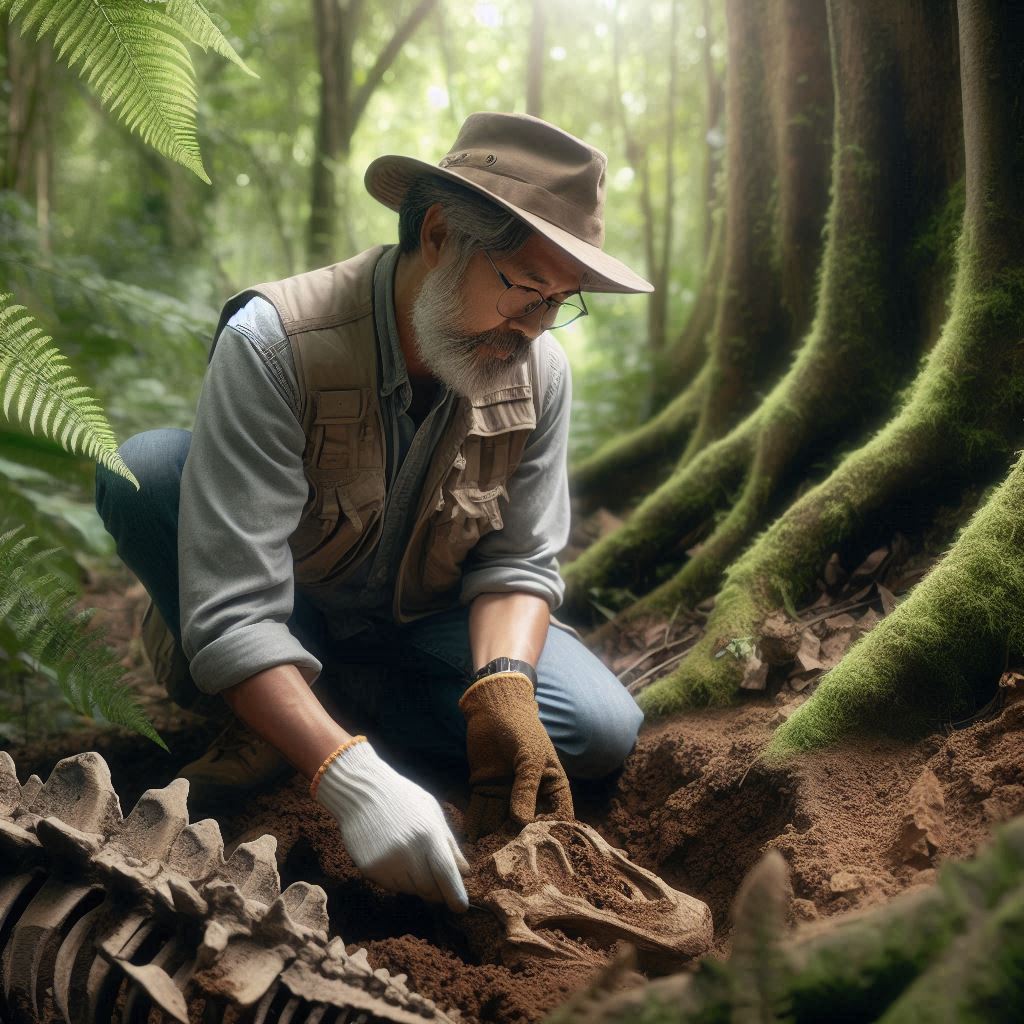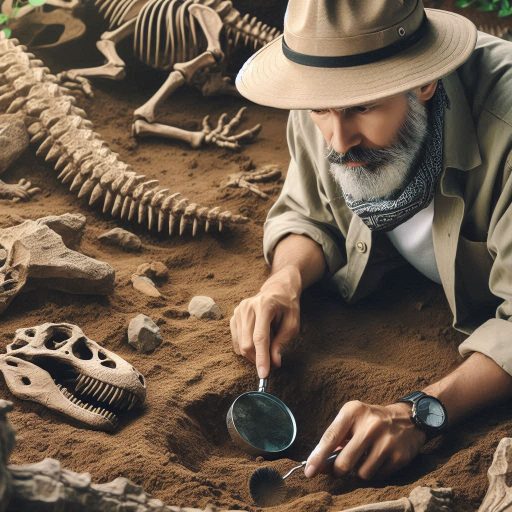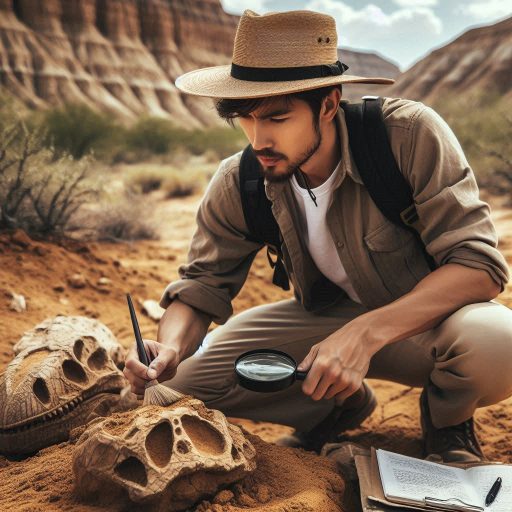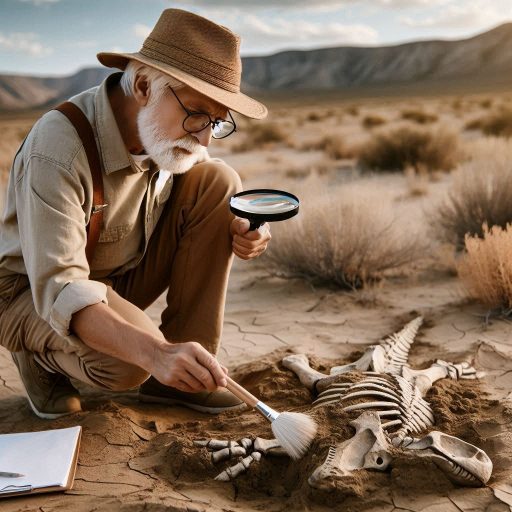Introduction
Gaining field experience in paleontology is essential for aspiring scientists.
It allows students to apply classroom knowledge in real-world settings.
Fieldwork helps develop practical skills necessary for fossil excavation and identification.
Hands-on experience offers numerous benefits for budding paleontologists.
Working in the field enhances observational skills and attention to detail.
Students learn to use essential tools and techniques, such as excavation equipment and mapping tools.
This experience fosters teamwork and communication, as fieldwork often involves collaboration with peers and professionals.
Field experience also cultivates problem-solving abilities.
Paleontologists frequently face unexpected challenges, such as difficult terrain or weather conditions.
Overcoming these obstacles builds resilience and adaptability, which are crucial traits in scientific research.
Field experience enhances career opportunities in paleontology.
Employers often prefer candidates with practical experience and strong field skills.
Participating in fieldwork can lead to valuable networking opportunities with professionals in the field.
Internships, volunteer opportunities, and university-sponsored digs provide excellent avenues to gain experience.
Gaining field experience in paleontology is vital for success.
It equips students with practical skills, enhances career prospects, and fosters a deeper understanding of ancient life.
Aspiring paleontologists should actively seek opportunities to gain hands-on experience in the field.
Research and Preparation
Research Different Paleontology Field Opportunities
Gaining field experience in paleontology is essential for aspiring scientists.
Start by researching various field opportunities available in this exciting field.
Many universities, museums, and research organizations offer programs and internships.
These opportunities provide hands-on experience in fossil excavation, identification, and documentation.
Online platforms and professional organizations are excellent resources for finding field opportunities.
Websites like the Paleontological Society and the Society of Vertebrate Paleontology list upcoming fieldwork projects and internships.
Additionally, consider attending paleontology conferences or seminars.
Networking at these events can lead to valuable connections and potential fieldwork opportunities.
Social media platforms, such as LinkedIn and Twitter, can also be helpful.
Follow paleontologists, institutions, and organizations that share field opportunities.
Engaging with professionals in the field can provide insights into available projects and programs.
Identify Potential Field Sites or Programs to Apply To
After researching, identify specific field sites or programs that interest you.
Consider local, national, or international options based on your availability and preferences.
Popular field sites often include fossil-rich locations, such as deserts, riverbeds, and cliffs.
Sites in the western United States, like the Badlands or Hell Creek Formation, are well-known for rich fossil deposits.
Many universities offer summer field schools focused on paleontology.
These programs typically involve hands-on excavation experiences led by experienced faculty.
They often include lectures and workshops on various aspects of paleontology.
When applying to field programs, ensure you meet the prerequisites.
Some programs may require prior coursework in geology, biology, or paleontology.
Others may look for relevant volunteer experience.
Carefully review each program’s application requirements and deadlines.
Learn About the Specific Skills and Knowledge Required for Fieldwork
Understanding the specific skills and knowledge required for fieldwork is crucial.
Paleontology fieldwork often demands skills such as fossil identification and excavation techniques.
Familiarize yourself with different fossil types and their characteristics.
Additionally, learn about geological principles and stratigraphy.
Understanding rock layers and sedimentary processes enhances your ability to locate fossils effectively.
Fieldwork often requires teamwork and communication skills.
Collaborating with other team members fosters a productive work environment.
Additionally, being able to communicate findings clearly is essential for future research.
Research and practice using tools commonly employed in the field, such as trowels, brushes, and chisels.
Familiarity with these tools will increase your confidence during excavations.
Understand the Safety Precautions and Equipment Needed for Field Expeditions
Safety precautions are paramount during field expeditions.
First, familiarize yourself with potential hazards, such as unstable terrain or extreme weather conditions.
Always prioritize personal safety and the safety of your team.
Proper equipment is essential for a successful field experience.
Invest in sturdy footwear, hats, and sun protection to stay comfortable in the field.
Bring essential supplies, including first-aid kits, water, and food for long days of excavation.
Understand the importance of working in groups during fieldwork.
Always have a buddy system in place to enhance safety and communication.
Finally, ensure you are trained in basic first aid and emergency procedures.
Being prepared can make a significant difference during field expeditions.
Gaining field experience in paleontology requires research, preparation, and safety awareness.
By exploring opportunities, identifying suitable programs, and understanding necessary skills, aspiring paleontologists can enhance their careers.
Embracing safety precautions and proper equipment ensures a productive and enjoyable field experience.
Networking and Building Connection
Connect with Professionals in the Field
Establishing connections with professionals is essential for budding paleontologists.
Start by reaching out to professors at your university.
They can provide valuable insights and opportunities for fieldwork.
Attend public lectures and seminars hosted by local universities or museums.
These events often feature experienced paleontologists sharing their research.
Networking through social media platforms can also be beneficial.
Follow paleontologists on Twitter, LinkedIn, or research-focused platforms like ResearchGate.
Engaging with their content may lead to meaningful discussions.
Do not hesitate to ask questions or express your interest in their work.
Building these connections can lead to fieldwork opportunities, internships, or research collaborations.
Attend Conferences, Workshops, and Events
Conferences, workshops, and events are excellent opportunities for networking.
They provide platforms to meet experts and learn about current research.
Look for paleontology-specific conferences, such as the Society of Vertebrate Paleontology annual meeting.
These gatherings often feature presentations, poster sessions, and networking opportunities.
Workshops can enhance your skills and knowledge in specific areas.
Many universities and organizations host workshops focusing on fossil preparation, excavation techniques, and data analysis.
Participating in these events not only improves your skills but also connects you with professionals and peers.
Join Paleontology Organizations or Clubs
Joining paleontology organizations or clubs allows you to network with like-minded individuals.
Many universities have student organizations focused on paleontology and related fields.
These groups often organize field trips, guest lectures, and social events.
Participating in these activities fosters a sense of community among aspiring paleontologists.
National organizations, like the Paleontological Society, offer membership opportunities for students.
Becoming a member provides access to resources, publications, and networking events.
Many organizations also host regional meetings and workshops.
These gatherings allow you to meet professionals and expand your knowledge base.
Seek Out Mentors for Guidance
Finding a mentor can significantly enhance your journey in paleontology.
A mentor provides valuable guidance, support, and advice.
They can help you navigate educational and career paths in the field.
Consider reaching out to professors, researchers, or professionals you admire.
Many mentors are willing to share their experiences and insights.
They may offer advice on internships, fieldwork, or research opportunities.
Establishing a mentor-mentee relationship can also lead to further networking opportunities.
A strong mentor can introduce you to other professionals in the field.
Gaining field experience in paleontology requires proactive efforts and networking.
Connecting with professionals, attending events, joining organizations, and seeking mentors are crucial steps.
These strategies will enhance your education and provide valuable field experiences.
Embrace every opportunity to learn and grow in this exciting field of study.
Your dedication will lead to a successful career in paleontology.
Read: The Impact of Technology on the Chemist Profession in the US
Volunteer and Internship Opportunities
Exploring Volunteer Programs or Internships
Gaining field experience in paleontology is essential for aspiring paleontologists.
One of the best ways to start is by exploring volunteer programs or internships.
Many museums, universities, and research institutions offer structured programs for students and enthusiasts.
These programs often provide opportunities to engage in meaningful work.
You can participate in fossil excavations, assist with educational outreach, or support ongoing research projects.
By volunteering, you not only gain valuable experience but also contribute to the scientific community.
Research different institutions to find programs that align with your interests.
Some organizations may focus on marine paleontology, while others may specialize in dinosaurs or ancient plants.
Apply to multiple programs to increase your chances of securing a position.
Gain Hands-On Experience
Hands-on experience is invaluable in the field of paleontology.
By assisting with fossil excavations, field surveys, or lab work, you can develop essential skills.
Fieldwork allows you to learn excavation techniques and fossil identification.
During excavations, you will learn how to carefully uncover fossils without damaging them.
This experience teaches you proper techniques for documenting the location and context of each find.
Field surveys help you understand geological formations and how fossils relate to their environments.
Lab work offers additional opportunities to gain experience.
You may help prepare fossils for study, which involves cleaning, casting, or reconstructing specimens.
This hands-on experience is crucial for developing practical skills necessary for a career in paleontology.
Build Relationships with Experienced Paleontologists
Networking is vital in the field of paleontology.
Build relationships with experienced paleontologists who can provide mentorship and recommendations.
These professionals can offer valuable insights into the field and guide your career path.
Engage with your mentors by asking questions and seeking advice.
Attend lectures, workshops, and conferences where you can meet established paleontologists.
Participate in discussions and express your enthusiasm for paleontology.
Mentorship can lead to opportunities for collaboration on research projects or fieldwork.
Experienced professionals often have connections that can help you find internships or job openings.
Building a strong network of contacts can significantly enhance your career prospects.
Keep a Record of Your Experiences
As you gain field experience, keep a record of your accomplishments.
Documenting your experiences is essential for future reference.
Create a portfolio that includes your volunteer work, internships, and relevant skills acquired.
Maintain a detailed log of each project you participate in.
Include information about your role, the skills you learned, and the outcomes of the projects.
This documentation can be invaluable when applying for jobs or further educational opportunities.
In addition, consider writing reflections on your experiences.
Reflecting on what you learned helps reinforce your knowledge and understanding.
It also allows you to articulate your experiences when discussing your qualifications with potential employers.
In summary, gaining field experience in paleontology involves exploring volunteer programs, assisting with hands-on projects, building relationships with professionals, and keeping records of your experiences.
By actively seeking out opportunities, you can develop the skills necessary for a successful career in paleontology.
Read: US Chemistry Conferences and Symposiums to Attend in 2024
Field Courses and Training Programs
Enroll in Field Courses or Training Programs
To gain field experience in paleontology, enroll in field courses or training programs.
Many universities and research organizations offer specialized programs.
These courses provide essential knowledge and hands-on experience in various paleontological techniques.
Programs often include lectures, field trips, and laboratory work.
Students engage directly with fossils and learn proper handling techniques.
This experience enhances understanding and fosters enthusiasm for the subject.
Institutions like the University of California, Berkeley, and the University of Wyoming offer excellent field courses.
These programs cover diverse topics, from dinosaur fossils to marine paleontology.
By participating in such programs, students prepare themselves for future research opportunities.
Learn Field Techniques
Learning field techniques is vital for aspiring paleontologists.
Fossil identification is a fundamental skill that every paleontologist must master.
Knowing how to recognize different fossils enhances research effectiveness.
Mapping techniques are also essential in paleontological fieldwork.
Understanding how to document fossil locations aids in reconstructing ancient environments.
Proper mapping contributes significantly to data collection and analysis.
Excavation techniques form another critical aspect of fieldwork.
Learning how to excavate fossils carefully prevents damage during the process.
This skill is crucial for ensuring that fossils remain intact for further study.
Gain Practical Experience Under Supervision
Gaining practical experience in fieldwork is essential for a career in paleontology.
Seek opportunities to work under the supervision of experienced paleontologists.
Many research projects offer internships or volunteer positions for students.
These positions allow students to participate in real excavations and field studies.
Working alongside professionals provides valuable mentorship and guidance.
Students can ask questions and learn best practices from those in the field.
Participating in fieldwork also helps students develop essential teamwork skills.
Collaborating with others fosters communication and problem-solving abilities.
These experiences enhance resumes and make candidates more appealing to future employers.
Seek Out Scholarship Opportunities
Scholarship opportunities can help support your training in paleontology.
Many universities and organizations offer financial aid specifically for students pursuing field experiences.
Research available scholarships and application requirements early to ensure you don’t miss out.
Some field courses may provide their own funding options for students.
Seek out grants, fellowships, or internships that offer stipends or funding for training.
Applying for these opportunities can significantly reduce the financial burden.
In addition, consider joining professional organizations in paleontology.
Membership often provides access to exclusive scholarships and funding resources.
In the end, gaining field experience in paleontology requires proactive steps.
Enroll in field courses and learn essential techniques, such as fossil identification and excavation.
Seek practical experience under the supervision of seasoned professionals.
Finally, explore scholarship opportunities to support your training.
These steps will prepare you for a successful career in paleontology.
Read: Key Roles and Responsibilities of a Chemist in the US
Transform Your Career Today
Unlock a personalized career strategy that drives real results. Get tailored advice and a roadmap designed just for you.
Start Now
You Might Also Like: Neuroscientist Salary Expectations in the USA
Discover More: Advancements in Microbial Genomics Research
Fieldwork and Data Collection
Participate in Field Expeditions with Experienced Paleontologists
Gaining field experience in paleontology often begins with participating in expeditions.
Joining experienced paleontologists on their field trips offers invaluable hands-on learning opportunities.
These expeditions allow you to explore various fossil sites and uncover ancient remains.
You can observe how seasoned professionals approach different excavation challenges.
Participating in fieldwork enhances your understanding of geological formations and fossil contexts.
Many universities and research institutions organize field trips for students.
Seek out these programs and apply to join them.
Networking with professionals during these expeditions can lead to mentorship opportunities.
This guidance is crucial for developing your skills and understanding of the field.
Be proactive and enthusiastic while working with experts, as this can lead to further opportunities.
Practice Field Techniques Such as Prospecting, Excavation, and Data Recording
Fieldwork involves various techniques that are vital for paleontological research.
Practice prospecting by searching for fossils in different geological settings.
Learn how to identify promising sites based on rock formations and sediment types.
Familiarize yourself with excavation techniques to safely extract fossils from their matrix.
Understanding how to carefully remove fossils is crucial to preserving their integrity.
You will often use tools like brushes, chisels, and shovels during excavations.
Additionally, mastering data recording is essential for documenting your findings accurately.
Keep detailed notes on the location, depth, and condition of each fossil.
Collecting data about the surrounding environment is equally important.
This context helps researchers understand the conditions under which the fossils existed.
Regularly practicing these field techniques will enhance your skills and confidence.
Work on Research Projects That Contribute to the Understanding of Paleontological Sites or Specimens
Engaging in research projects is another way to gain field experience.
Collaborate with universities, museums, or research institutions that focus on paleontology.
Seek out projects that align with your interests, such as studying specific fossils or ecosystems.
Working on these projects allows you to contribute to ongoing research efforts.
Your involvement can range from fieldwork to data analysis and interpretation.
This hands-on experience deepens your understanding of paleontological processes and methodologies.
Additionally, collaborating with a team will enhance your communication and teamwork skills.
Develop Skills in Observation, Documentation, and Analysis of Fossil Specimens
To excel in paleontology, you must develop strong observational skills.
Practice closely examining fossils to identify features and characteristics.
Understanding morphology is crucial for classification and analysis.
Documentation skills are equally important.
Keep organized records of your observations, findings, and methodologies.
This practice ensures that your work is reproducible and credible.
Additionally, analyze your data critically to draw meaningful conclusions.
Engage with mentors or peers to discuss your observations and analyses.
This collaborative process can provide new perspectives on your findings.
By continuously honing your skills in observation, documentation, and analysis, you will build a solid foundation for your paleontological career.
Gaining field experience in paleontology requires active participation in expeditions, practicing techniques, engaging in research, and developing critical skills.
Embrace every opportunity to learn and grow in this fascinating field.
Read: Essential Skills and Tools for Modern Chemists in America
Communication and Outreach
Share Your Field Experiences and Discoveries
Gaining field experience in paleontology involves sharing your discoveries with a broader audience.
Presentations at conferences are an excellent way to showcase your findings.
You can explain your fieldwork, methodologies, and the significance of your discoveries.
Engaging in discussions with peers often leads to valuable feedback and new ideas.
Creating a blog allows you to document your field experiences.
Write about your adventures, challenges, and exciting discoveries.
Share photos, detailed descriptions, and insights from your fieldwork.
A well-maintained blog can attract a following of fellow paleontology enthusiasts.
Social media platforms offer another avenue for sharing your experiences.
Use platforms like Twitter, Instagram, or Facebook to post updates and findings.
Sharing your work can inspire others and foster connections within the paleontological community.
Online discussions can lead to collaborations or new opportunities.
Engage with the Public
Engaging with the public is crucial for promoting interest in paleontology.
Participate in outreach programs and events at schools or community centers.
You can organize talks, workshops, or hands-on activities that involve fossils.
These interactions help demystify paleontology and encourage curiosity among young learners.
Attending science fairs or local festivals allows you to showcase your work.
Set up a booth with displays of fossils and educational materials.
Engaging directly with attendees can spark interest in paleontology and its significance.
Distributing informative brochures or flyers can further spread awareness.
Additionally, volunteering at museums or science centers allows for meaningful public engagement.
You can assist in organizing educational programs or leading guided tours.
These experiences provide insight into effective communication and public education techniques.
Educate Others About Fossil Preservation
As a paleontologist, educating others about fossil preservation is essential.
Discuss the importance of protecting fossil sites and ecosystems.
Highlight the threats posed by climate change, urban development, and irresponsible collecting practices.
Share your knowledge through presentations, workshops, and social media campaigns.
Collaborating with local organizations can enhance your outreach efforts.
Partner with conservation groups to promote fossil preservation initiatives.
Your involvement can lead to community projects focused on protecting paleontological sites.
Creating educational materials can further support your advocacy.
Develop pamphlets, posters, or online resources detailing fossil preservation efforts.
Distributing these materials during outreach events increases awareness and fosters community support.
Collaborate with Researchers and Scientists
Collaboration is key to effectively communicating your findings.
Work with researchers and scientists in the field of paleontology.
This collaboration can lead to joint presentations or publications.
Peer-reviewed articles allow you to share your discoveries with the scientific community.
Participating in research projects provides opportunities for collaboration.
You can learn new methodologies and gain insights from experienced scientists.
Building relationships with mentors and colleagues can lead to fruitful partnerships.
Effective communication of your findings is essential for advancing knowledge in paleontology.
Use clear language and visuals to present your research.
Tailor your message for different audiences, including scientists and the general public.
This adaptability enhances your ability to convey complex ideas.
In short, gaining field experience in paleontology involves sharing discoveries, engaging with the public, and educating others.
Collaborating with researchers strengthens your findings and enhances communication.
By actively participating in outreach efforts, you contribute to the broader understanding of paleontology and its significance.
Your passion and dedication can inspire future generations of paleontologists.
Uncover the Details: Challenges Faced by Marine Biologists
Conclusion
Gaining field experience in paleontology is essential for aspiring scientists.
Fieldwork allows you to apply classroom knowledge in real-world settings.
You learn how to excavate fossils, identify geological formations, and collect data effectively.
This hands-on learning enhances your understanding of ancient ecosystems and fossilization processes.
Practical skills development is crucial in paleontology.
Field experience helps you master various tools and techniques.
You also gain valuable experience in teamwork, problem-solving, and critical thinking.
These skills are vital for any successful career in the field.
Aspiring paleontologists should take the initiative to seek out field opportunities.
Consider joining university-led expeditions or volunteering with local museums.
Internships at research institutions can provide invaluable exposure to ongoing projects.
Online platforms also offer resources for finding fieldwork opportunities.
The potential career benefits of gaining field experience are significant.
Employers value hands-on experience, which sets you apart in a competitive job market.
Fieldwork can lead to networking opportunities with professionals in the field.
Moreover, the experiences you gain can inspire your future research interests.
By actively pursuing field opportunities, you lay a solid foundation for a successful career in paleontology.
[E-Books for Sale]
The Big Book of 500 High-Paying Jobs in America: Unlock Your Earning Potential
$19.99 • 500 High-Paying Jobs • 330 pages
Explore 500 high-paying jobs in America and learn how to boost your career, earn more, and achieve success!
See All 500 High-Paying Jobs of this E-Book
1001 Professions Without a Degree: High-Paying American Jobs You Can Start Now
$19.99 • 1001 Professions Without a Degree • 174 pages
Discover 1001 high-paying jobs without a degree! Unlock career tips, skills, and success strategies for just $19.99!




